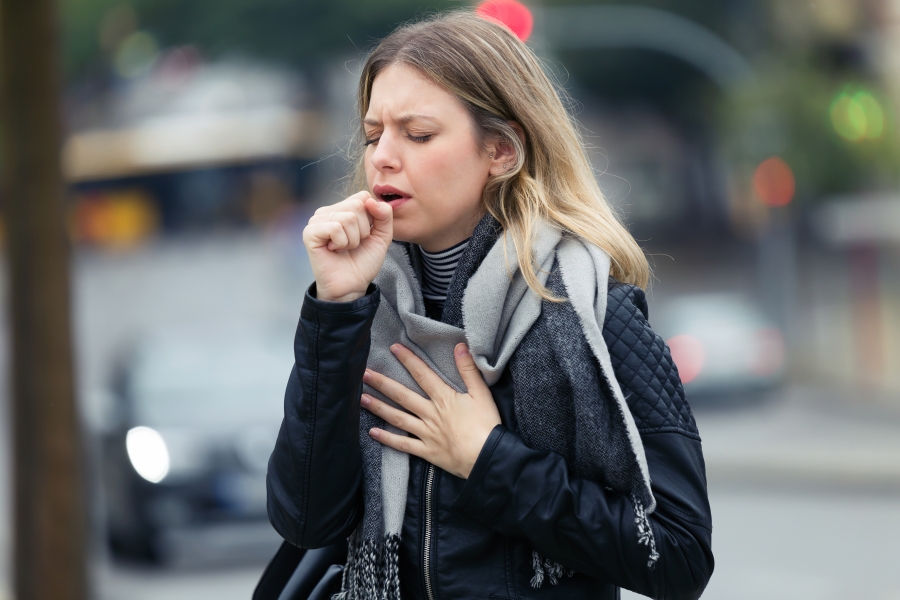It used to be that if you had a mild cough, you often just waited for it to clear up or took some over-the-counter cough medicine to ease your discomfort. If it was more severe or was accompanied by other symptoms, you went to a doctor to find out how to treat it.
But now, the slightest cough may cause immediate alarm since it's a common COVID-19 symptom.
Although coughing may be a symptom of COVID-19, there are many other reasons you may cough. The questions below should help ease your mind about the source of your cough, and what you should do about it once it starts.
What causes coughs?
There are numerous reasons you may cough. These include:
-
You’ve been exposed to irritants or pollutants. You may find yourself coughing in dusty rooms or highly polluted areas, or if you breathe in strong chemicals or smoke. In many cases, coughing will stop soon after you’re no longer exposed to the irritants.
-
You have a virus. A viral illness, such as a cold, the flu or the coronavirus, may cause coughing. If you have a viral illness, you’ll probably experience a few other symptoms in addition to coughing, such as a runny nose, sore throat or fever.
-
You have asthma or allergies. Allergies or asthma may trigger bouts of coughing. Asthma may also be accompanied by a tight feeling in your chest or shortness of breath. It’s not always easy to tell if you have allergies or a cold, as the symptoms can be similar.
-
You have gastroesophageal reflux disease (GERD). GERD occurs when stomach acids flow backward into your esophagus from your stomach. The acids irritate the sensitive lining of the esophagus and may cause coughing, heartburn, a bad taste in your mouth or a lump-in-the-throat sensation.
-
You smoke. Often referred to as a smoker’s cough, this type of cough may occur as your body tries to push chemicals out of your lungs.
What's the difference between a wet cough and dry cough?
Your doctor will likely ask if you have a wet or dry cough. If you have a wet cough, also known as a productive cough, you may cough up mucus or notice a salty taste in your mouth. A wet cough typically occurs if you have the flu, a cold, bronchitis, pneumonia or chronic obstructive pulmonary disease (COPD).
Dry coughs don’t produce any mucus and can be hard to control. In fact, you may find it difficult to stop coughing once you start. A dry cough can occur due to exposure to irritants, or if you have allergies, asthma, croup, GERD, sinusitis or COVID-19.
How can I stop coughing so much?
Over-the-counter cough medications can be helpful if you have a cough, as can cold and flu medications in some cases. Although cough medicines don’t treat the source of your cough, they reduce coughing and allow you to get more sleep and be more comfortable.
Humidifiers are recommended for both dry and wet coughs. The machine produces a steady flow of moist air that helps ease coughing and congestion.
Drinking plenty of fluids helps thin out mucus and may also reduce coughing. If you have asthma, allergies or GERD, treating your underlying condition can prevent coughing.
How do I know if my cough is serious?
Get in touch with your doctor if you have a mild cough that doesn’t go away in 1-2 weeks.
A chronic cough is when a cough lasts more than 8 weeks. The Temple Lung Center’s Chronic Cough Program specializes in finding the cause of your chronic cough. Our specialists can offer treatments to lessen the cough or address the underlying issue.
You can schedule an appointment with our Chronic Cough Program team by calling 800-TEMPLE-MED (800-836-7536) or requesting an appointment.
But if your cough is accompanied by any of these symptoms, call your doctor right away (even if you’ve only had a cough for a short time):
- Shortness of breath
- Trouble swallowing
- Green or yellow phlegm
- Fever
- Wheezing
- Inability to sleep due to constant coughing
If you have extreme difficulty breathing, trouble swallowing, chest pain, blue lips or skin, or bloody phlegm, go to the nearest emergency room immediately or call 911.
Helpful Resources
Looking for more information about the cause of your cough?
- Learn about the different types of cough and how we treat chronic cough
- What to do about a nagging cough — advice from Temple pulmonologist Sean Duffy, MD
- Read more about our Chronic Cough Program
- Meet our specialists

